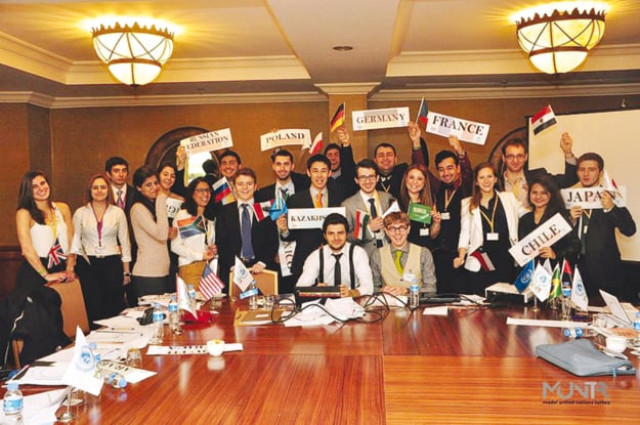Talking heads
Initiatives like Model United Nations expose students to the power of meaningful dialogue.


Pakistan’s IBA delegation at the Turkey MUN. PHOTO COURTESY: MUNTR
For Pakistani students, this skill is particularly important since the country’s reality often forces them to form strong opinions on key world issues from a young age. Exposure at global platforms like the MUN, where they cannot only express themselves but also hear out the various sides involved, hence, provides them with valuable insight.
According to Sagar Jagani, a student at the Lahore University of Management Sciences (LUMS) and a two-time winner of Harvard World MUN, the most prestigious MUN in the world, these conferences have made him more tolerant and respectful towards others. “With every conference, I have developed my ability to work with people from diverse backgrounds and appreciate different points of view,” he says. Although he has been debating since third grade, he stresses that the MUN is different as it not only requires you to be a good public speaker but also a good diplomat.
As of 2012, over 400 MUNS are organised annually across North America, Europe, Asia Pacific, Latin America, the Middle East and Africa. Participants ranging from middle-school students to graduate students are selected as delegates for the six General Assembly committees, the Economic and Social Council and the Economic and Financial Committee. The delegates are required to prepare draft resolutions, plot strategies, negotiate with supporters and opponents, resolve conflicts and navigate the rules of procedure as applied in respective UN bodies. Before stepping into the shoes of ambassadors, students are required to research global concerns that affect the international community, including everything from peace and security to human rights, food and hunger, the environment, economic development and globalisation. And each delegate is required to represent a country other than their own at almost all MUNS.

The LUMS team at the Harvard World MUN in 2013. PHOTO COURTESY:SAGAR JAGANI
“The fact that you are being assigned multiple countries and debating topics that might be regional but affect the entire world is fascinating,” says Raza Ayub, a senior at IBA who chaired the 2013 MUN in Turkey. He cites the militancy in Afghanistan as one of the issues that affects countries worldwide. “It helps you get a more holistic view of the problem rather than what it means for a single country.” Along with helping them develop a more nuanced understanding of the world they live in, MUNs also help participants develop their research, leadership, teamwork and public-speaking skills.
The first Pakistani MUN was held at LUMS in 2002 and the concept has since grown, with many other schools and colleges getting on board. The conferences have now started hosting chairs from various countries such as Indonesia, Paris and the Netherlands.
“I was really impressed by the importance of MUNs in Pakistan and I see it as a really good practice for students to try to resolve contemporary issues,” says Ma Non, a student of International Law at Aix-Marseille University in Paris, who came to Pakistan in January this year to chair the International Monetary Fund (IMF) committee at the MUNIK V organised by IBA.
Ayub, on the other hand, feels that debating in Pakistan has a long way to go. He elaborates that delegates at Pakistani MUNs often resort to unnecessary criticism and screaming to get their point across, which is in stark contrast to the maturity and pragmatism he witnessed at the Turkey MUN. To be at par with the global MUNs, it is crucial for Pakistani students to take part in international conferences. “These conferences have metamorphosed from socio-political think tanks into associations that nurture agents of positive social change,” says Jagani.

Nida Haroon, winner of three international MUN conferences, shares that by the time conferences end, you end up becoming friends with many strangers who are intrigued by your country and lifestyle. Food, films, Eid customs, Basant rituals and cultural and social diversity usually feature on top of her list of things one must experience in Pakistan. “There is no better feeling in the world than breaking stereotypes,” she says. And what better place to do that than at a MUN where the entire world is listening.
Javeria Khalid Petiwala is an undergraduate student who loves fiction, writing and travelling.
Published in The Express Tribune, Sunday Magazine, August 17th, 2014.



















COMMENTS
Comments are moderated and generally will be posted if they are on-topic and not abusive.
For more information, please see our Comments FAQ